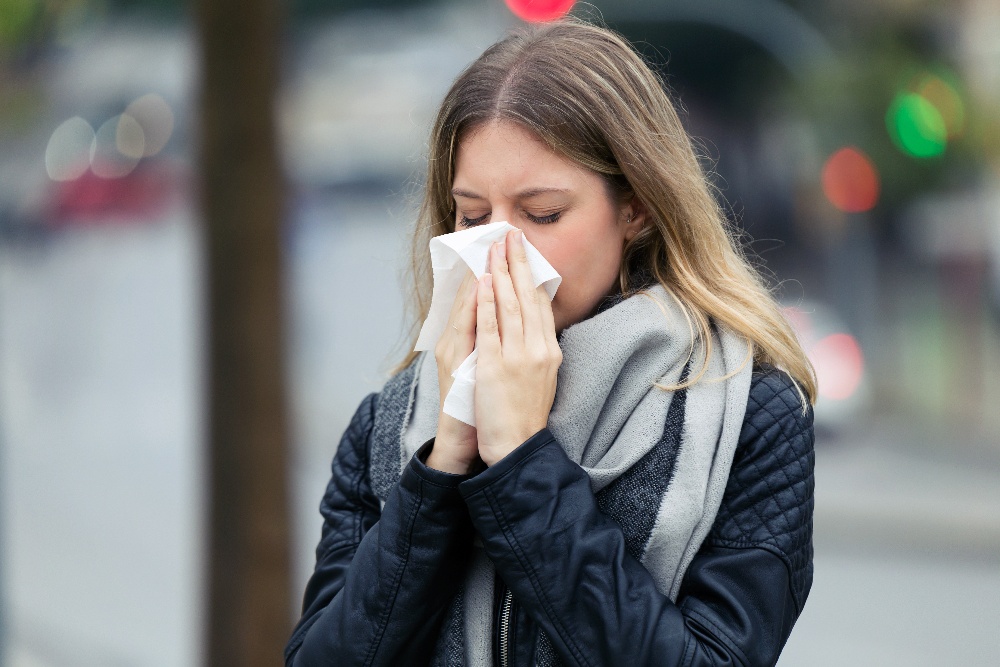How to Manage Seasonal Allergy Symptoms in Winter

Seasonal allergies often bring spring or fall to mind, but for some, winter can trigger its own set of challenges. Despite the colder months reducing common outdoor allergens like pollen, allergens such as dust mites, mold, and pet dander become more noticeable as we spend more time indoors. Understanding how to manage these allergy symptoms can help make your winter months more comfortable.
Winter Allergies And You
Winter allergies occur when your immune system reacts to indoor allergens commonly found during the colder months. These allergens are often heightened due to increased time spent indoors. Unlike spring allergies that are caused by blooming flowers and trees, winter allergies result from things like dust collecting in heating vents, lingering mold spores, and the constant presence of pets inside the home.
Symptoms to Watch For
Winter allergies can feel similar to a seasonal cold, but there are some telltale signs to look out for. Symptoms may include:
- Sneezing and a runny or stuffy nose
- Itchy or watery eyes
- Scratchy throat or persistent cough
- General fatigue and trouble sleeping (from nasal congestion)
Unlike a cold, winter allergy symptoms linger for weeks or longer, especially if the allergens around you aren’t addressed.
Managing Winter Allergies
Thankfully, there are several steps you can take to reduce the impact of winter allergies at home. Here are a few practical approaches:
1. Reduce Indoor Allergens
- Regular Cleaning: Vacuum often, using a vacuum equipped with a HEPA filter to trap allergens like dust mites and pet dander. Don’t forget to clean rugs, curtains, and furniture where allergens can accumulate.
- Control Mold Growth: Use a dehumidifier to keep humidity levels below 50%, as mold thrives in damp conditions. Inspect hidden spaces like basements or bathrooms for mold and clean any problem areas promptly.
- Wash Bedding Weekly: Dust mites love warm, humid areas, making your bed a prime spot. Washing sheets and pillowcases in hot water can help reduce their presence.
2. Monitor Your HVAC System
Your heating system can circulate dust, mold, and other allergens. Replace filters regularly and consider using an air purifier to help trap harmful particles in the air.
3. Address Pet Allergies
Pets are cherished family members, but their fur and dander can worsen allergy symptoms. Bathe and groom your pets frequently, and try to keep them out of bedrooms or off upholstered furniture.
4. Opt for Nasal Rinses and Over-the-Counter Remedies
Saline nasal rinses or sprays can help flush out allergens and clear nasal congestion. Some individuals also find relief using over-the-counter antihistamines or decongestants, but it’s always best to consult with your physician before adding new medications.
When to Consult an Allergy Specialist
If your symptoms persist despite making changes at home, or if they interfere with your daily activities and sleep, it may be time to seek help from an allergy specialist. Allergy specialists can perform tests to identify your specific triggers and recommend treatments such as immunotherapy (allergy shots) or specialized medication. They can also provide personalized advice on managing your symptoms and avoiding allergens effectively. Consulting a specialist early can improve your quality of life and prevent potential complications from uncontrolled allergies.
You Don’t Have to Go It Alone
Winter allergies can be challenging, but with the right management strategies, they don’t have to control your season. From reducing allergens in your home to seeking expert advice, there are plenty of ways to combat your symptoms. If you’ve tried managing symptoms on your own and still struggle, don’t hesitate to reach out for professional care. Remember, getting help from a specialist could bring you one step closer to breathing easier this winter.





